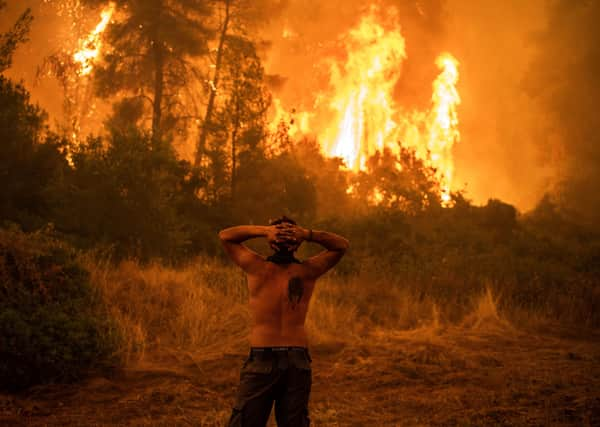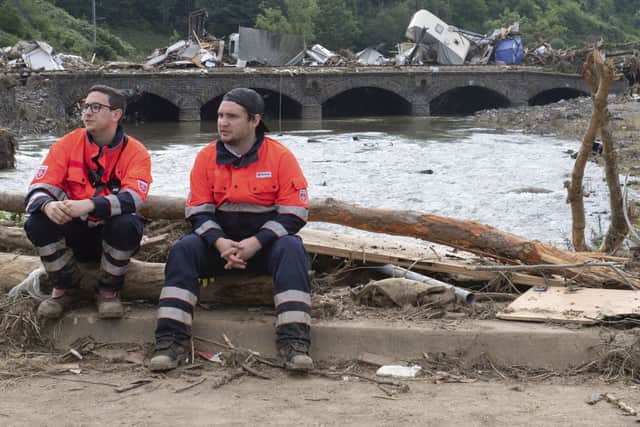Climate change; why the case for green taxes has still to be won – Bill Carmichael


He said we were now “dangerously close” to running out of time to limit the rise in global temperatures, and that the results will be “catastrophic” if no urgent action is taken to reduce carbon emissions.
He isn’t the first to make such a claim, and I doubt he will be the last. In fact Mr Sharma’s prediction is at the moderate end of the spectrum. For at least 20 years, we’ve been subjected to far worse warnings including claims that the world will end in 12 years’ time and billions will die, because of climate change.
Advertisement
Hide AdAdvertisement
Hide AdBut despite these blood-curdling forecasts the general public seems unmoved – at least up to now. Bread and butter issues such as jobs, taxes, housing, health and education take precedence. Party canvassers report that climate change rarely crops up in doorstep conversations with voters.


Perhaps that is finally starting to change. I am told that usage statistics for online news show that stories about climate change are becoming increasingly popular. Mainstream news organisations are certainly ramping up coverage of this issue.
And this week a new survey indicated that perhaps the public is finally ready for the massive costs and drastic changes to lifestyle that will be necessary to decarbonise the economy.
Polling by Ipsos Mori found that 56 per cent of those questioned wanted the Government to reduce carbon emissions even faster than current targets, 54 per cent wanted all coal-fired power generation to end and 35 per cent supported the Government’s ban on the sale of new petrol cars from 2030.
Advertisement
Hide AdAdvertisement
Hide AdJessica Long, head of sustainability at Ipsos Mori, said the survey showed how keen Britons are for the Government to take action against climate change with “a particular interest in tighter regulations”.


Well, perhaps she is right, but colour me sceptical. Sure, when looked at in the abstract people are keen to pay more to combat climate change, but I wonder if their enthusiasm will wane once the bill hits the doormat.
Take, for example, the important issue of home heating. To reach government targets of net zero emissions by 2050, about 80 per cent of UK homes are going to have to switch from fossil fuels, such as gas, and install entirely new heating systems.
Will people be happy to rip out efficient and serviceable gas boilers and replace them with a ground heat pump at an estimated cost of between £12,000 and £20,000 per household?
Advertisement
Hide AdAdvertisement
Hide AdI don’t think so, and it comes as absolutely no surprise to discover that, according to some reports, the Government is backtracking on its commitment to ban gas boilers from 2035.
Expect more U-turns as reality bites. For another example, the public are keen on electric vehicles, which are clean and efficient, although new models are way out of the price range of most ordinary families.
Perhaps the price will come down over time but, either way, once the ban on new petrol cars comes into force we will all be required to switch to electric. But this leads to a simple question that has not been properly addressed – where is all the extra electricity to come from?
We are told we must phase out fossil fuels, which account for about 42 per cent of total energy generation, and nuclear, which provides 17 per cent. Currently renewables account for less than a quarter, and will need to be expanded massively just to cope with current demand. We are going to need two or three times the current electricity generation capacity to decarbonise transport. Where will this electricity come from and what is the cost?
Advertisement
Hide AdAdvertisement
Hide AdAnd that’s before we get around to telling people to stop eating meat and taking an annual flight for their summer holidays.
In all, I think delegates at the COP26 climate change conference in Glasgow in November have their work cut out to persuade countries to adopt tough emission targets, particularly when you consider that China is currently building three times more new coal power plants than the rest of the world put together.
In UK terms, and still more in global terms, anything approaching net zero looks a long way off.
Support The Yorkshire Post and become a subscriber today. Your subscription will help us to continue to bring quality news to the people of Yorkshire. In return, you’ll see fewer ads on site, get free access to our app and receive exclusive members-only offers. Click here to subscribe.
Comment Guidelines
National World encourages reader discussion on our stories. User feedback, insights and back-and-forth exchanges add a rich layer of context to reporting. Please review our Community Guidelines before commenting.